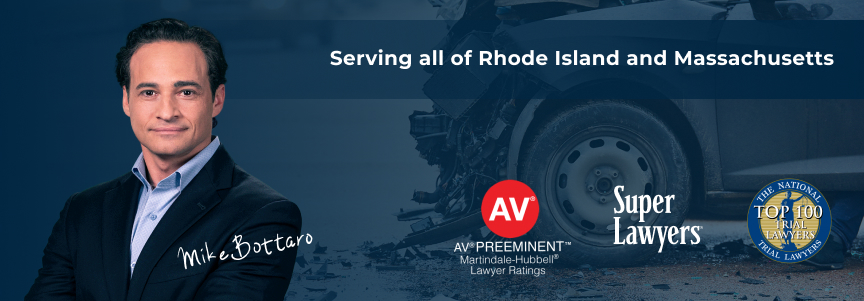
Rhode Island Motorcycle Helmet Laws
 Motorcyclists are vulnerable on the road because other drivers fail to respect their rights. But while you cannot control other drivers, wearing a helmet can decrease your risk of injury and death.
Motorcyclists are vulnerable on the road because other drivers fail to respect their rights. But while you cannot control other drivers, wearing a helmet can decrease your risk of injury and death.
Motorcycle helmet laws vary across the United States. If you’re planning to ride in Rhode Island, you should be aware of the state’s motorcycle helmet laws and what you can do to protect yourself on the road.
For more than a decade, Bottaro Law has advocated for the rights of injured people and helped them pursue fair compensation from the parties responsible for their injuries. Our legal team focuses exclusively on personal injury cases, which gives us in-depth knowledge we can apply to your lawsuit. Learn more about our services and how we can help you today with a free, no-obligation case review with a motorcycle accident lawyer in Rhode Island.
Contact Bottaro Law immediately if you have been injured in a motorcycle accident in Rhode Island.
What Is the Rhode Island Motorcycle Helmet Law?
Rhode Island does not have a universal motorcycle helmet law, which means that not all motorcyclists are required to wear helmets. According to Section 31.10-1.4 of the Rhode Island General Laws, motorcycle riders under 21 must wear helmets. Additionally, all new riders must wear helmets for the first year after obtaining their motorcycle license, regardless of age. Rhode Island General Laws specify that the penalty for violating these laws is an $85 fine.
Why Should You Wear a Helmet?
The main reason to wear a helmet is to protect yourself in the event of a crash. According to the National Highway Traffic Safety Administration (NHTSA), motorcyclists are about 28 times more likely than passenger car occupants to die in a crash based on vehicle miles traveled. Furthermore, motorcyclist fatalities accounted for 14 percent of all traffic fatalities in one recent year – the highest number since 1975. With this in mind, you should do whatever you can to protect yourself from injury in an accident.
No matter how safe you feel or how uncomfortable you think a helmet is, you need something between your skull and the road if you are involved in a crash. Head injuries are one of the most common causes of motorcycle accident fatalities.
Data from NHTSA show that 57 percent of motorcyclists killed in accidents in states without universal helmet laws were not wearing a helmet at the time of the collision. In states with universal helmet laws, only 11 percent of motorcyclists killed in accidents were not wearing a helmet at the time of the crash.
While helmets are not required for all motorcycle riders in Rhode Island, a little discomfort might be worth a decreased risk of death or a severe injury in case of a crash.
Do Motorcycle Passengers Have to Wear Helmets?
Under Rhode Island General Laws Section 31.10-1.6, all motorcycle passengers must wear a helmet, regardless of age. The penalty for breaking this law is an $85 fine. Passengers must also have their own seat, foot rests, and a handlebar or grip they can use while riding a motorcycle.
Motorcycle Helmets FAQs
Here are the answers to some of the most common questions about Rhode Island’s motorcycle helmet laws.
-
Can I recover compensation if I wasn’t wearing a helmet in a motorcycle crash?
Not wearing a helmet does not cause accidents and should not prevent you from recovering compensation if you were not to blame for the accident. In Rhode Island, the driver who did not follow the rules of the road or failed to take steps to prevent the crash is typically at fault for a motorcycle accident and can be held liable. Whether you were wearing a helmet should have no bearing on your ability to seek compensation if you were not at fault. Some insurance companies might try to deny your claim or decrease your payout if you were not wearing a helmet. That’s why you need our experienced motorcycle accident attorneys to fight for the total amount you deserve under the law.
-
How do I pick the right motorcycle helmet?
NHTSA has a guide you can use to find the right shape, size, and style of helmet. Most importantly, you should choose a helmet that fits snugly without being too tight. Your helmet should not move when you nod or shake your head, but you should not feel any painful pressure points. Try wearing your new helmet for about 30 to 45 minutes before riding, as pressure points may become more apparent over time. Ensure your helmet meets the safety standards the federal Department of Transportation sets. A helmet that meets these standards will have a sticker on the back that shows it meets Federal Motor Vehicle Safety Standard (FMVSS) No. 218.
-
When should I replace my helmet?
There are two situations in which you should replace your helmet right away. The first is if the helmet no longer fits you properly, since in that case, it may not fully protect you in the event of a crash. The second is if you have been involved in an accident. Helmets are designed to be one-time-use items, so if you hit your head in a crash, you need to replace the helmet immediately. Broken helmets provide little protection in the event of another accident.
Rhode Island Motorcycle Fatality Rates
According to the Rhode Island Department of Transportation (DOT), about 30 percent of motorcyclists killed statewide in one recent year were not wearing helmets. The DOT also reports that motorcycles are overrepresented in traffic deaths across the state, accounting for about 14 percent of all traffic fatalities despite making up only 3 percent of all registered vehicles.


